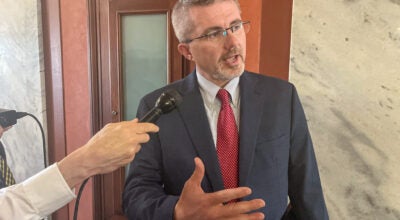Tennessee Gas argues against stay in pipeline case
Published 1:40 pm Wednesday, December 6, 2017
Tennessee Gas Pipeline Company has argued federal regulators should not block plans for its Pipeline No. 1 from moving forward.
The company filed an answer with the Federal Energy Regulatory Commission (FERC) on Dec. 1, arguing against a motion from environmental groups that want a stay of action in the case. In the 12-page document, Tennessee Gas alleges the environmental groups have failed to prove that its plans to abandon a 964-mile natural gas pipeline would cause “irreparable harm.” And it argues FERC “has no role to play” in determining whether the abandoned pipeline could subsequently be used to transport natural gas liquids (NGLs).
Pipeline No. 1 currently carries natural gas between Natchitoches Parish, Louisiana, and Columbiana County, Ohio, according to the answer. In between, it crosses Kentucky, including Boyle County.
Houston-based energy company Kinder Morgan, the parent company of Tennessee Gas, has plans to use the pipeline to carry NGLs, which are byproducts of fracking, from shale fields in the northeast to the Gulf of Mexico coast.
To accomplish that, Tennessee Gas has gained approval from FERC to “abandon in-place” the pipeline, meaning it could no longer be used for natural gas and FERC would no longer regulate the pipeline’s contents. The next step would be the sale of the pipeline from Tennessee Gas to another Kinder Morgan subsidiary, Utica Marcellus Texas Pipeline LLC. The plan calls for flow of the pipeline to be reversed in order to get the NGLs to the Gulf coast.
On Oct. 30, three groups identified as “intervenors” in the case — Allegheny Defense Project, Kentucky Heartwood and Kentucky Resources Council — asked FERC to reconsider its decision and to prevent the plan from moving forward until a rehearing is held, according to Tennessee Gas’ answer.
Opponents of the plan argue NGLs are more explosive, more toxic and much heavier than natural gas; that Pipeline No. 1 was not built to handle the added load or flow in the opposite direction; and that a leak or explosion could be devastating to local environments and economies along the path of the pipeline.
“Much of intervenors’ alleged harm comes from the potential use of the abandoned line to transport natural gas liquids. But as the Certificate Order correctly recognized, (FERC) has no jurisdiction to regulate this activity and could not appropriately place conditions on the operation of a natural gas liquids line even if it wished to do so,” Tennessee Gas argues.
The answer argues the intervenors are too vague in explaining what the harms the pipeline project would cause.
“The motion for stay appears to rest its irreparable harm arguments entirely on the mere fact that the project will cause some impacts to the environment. Intervenors have provided no evidence — beyond unsupported, generalized assertions — that they will suffer irreparable harm,” the answer reads.
Tennessee Gas argues it’s not FERC’s job to “mitigate risks associated with interstate (NGL) pipelines; it’s the job of the Pipeline and Hazardous Materials Safety Administration.
“FERC simply has no role to play in the repurposing of an abandoned pipeline,” the answer reads. “… Congress has granted FERC a comprehensive role in regulating the interstate transportation of natural gas in the Natural Gas Act. The Interstate Commerce Act’s grant of authority to FERC over pipeline transportation of … natural gas liquids is more limited — encompassing only the rates and terms and conditions of transportation.”
Tennessee Gas also argues that issuing a stay would cause it “substantial” financial damage.
“Tennessee first applied for this project in February 2015. The Certificate order was not issued until two and a half years later in 2017,” the answer reads. “Any further delay can only have an adverse effect on Tennessee and nothing in the Motion for Stay demonstrates otherwise. The truth is that this project has been thoroughly vetted and further delays are unwarranted.”
When Tennessee gas formally accepted FERC’s approval at the end of October, it noted it would not be moving forward with its “implementation plan” yet.
“Due to the length of time that has passed since Tennessee filed its application and uncertainty in current market conditions, Tennessee is working to confirm the degree of market interest in the project,” the October filing reads. “As a result, Tennessee is not in a position to prepare and file its implementation plan at this time. Tennessee will provide an update on this front in the coming months.”





